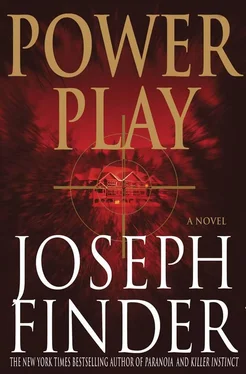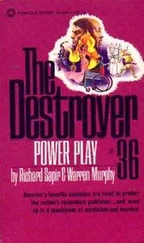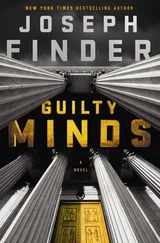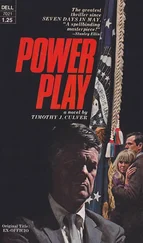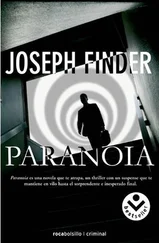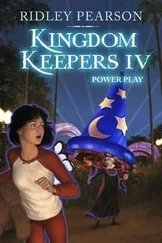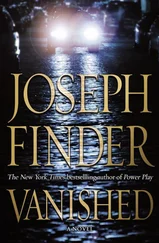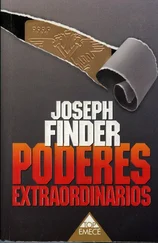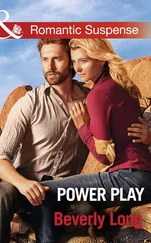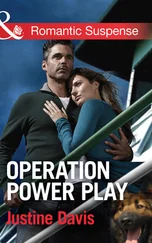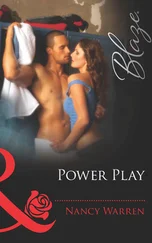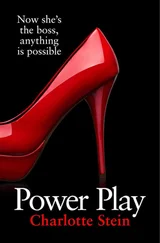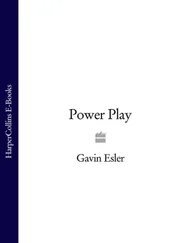"They're hunters who got lost," Cheryl said. "They're tired and hungry and all of a sudden they see this lodge, and they get the big idea to try a holdup. See if they can pull it off. If it wasn't us, it could have been a convenience store. These men aren't actually going to do anything so stupid as to kill one of us."
"They look mighty serious to me," Lummis said.
"There's a bright line between trying to bully a bunch of unarmed businessmen and cold-blooded murder," she said. "And they're not going to cross that line. They're hunters, not hired killers."
I couldn't hold back any longer. "I don't think they're hunters," I said softly.
"Why don't we find out what your CFO has to say about this," Barlow said with a malevolent smile. "You feel like staking your life on Cheryl's ability to read people, Ron? You're the one who gets his brains blown out first."
Slattery looked at Barlow, that panicked look returning, but he didn't reply.
Bo Lampack was trying to get everyone's attention, so we stopped and looked at him.
"If I may say something?" Lampack said. There was silence, so he went on. "Let's face it-a gun is really a phallus. Men like these who insist on waving guns around are really just waving their dicks around. They're compensating for their inadequacies. To challenge them outright is to emasculate them, which could provoke a really hostile and defensive reaction-"
"Will someone tell Russell to get in here and shoot this guy?" said Bross.
Lampack looked around for support, and when no one came to his defense, he sat back, looking deflated.
"They're not hunters," I tried again, a little louder.
Finally, Cheryl looked at me. "What makes you so sure of that, Jake?"
"For one thing, they're not equipped like hunters."
"And you know this how?"
"Because I hunt. I shoot."
"You shoot?" Bross said. "What, paintballs?"
"You want to hear me out or not?"
"Not especially."
"Let the kid talk," Barlow said wearily. "I've got to get to the john before my bladder bursts."
"Start with their outfits," I said. "The camouflage."
"Plenty of hunters wear camo," Lummis pointed out.
I nodded. "But they're not wearing the kind of camouflage you get at a hunting store," I said. "It's old military-issue." The pattern was the old six-color chocolate-chip camouflage, which the army had discontinued around the time of the first Gulf War. "They're also wearing genuine military tactical vests, with gear clips and mag pouches. Those sure aren't regular hunting vests." Hunting vests were normally made out of smooth acrylic so you didn't get snagged on brush or whatever.
"Well, so maybe they picked up their outfits at some Army-Navy surplus store somewhere," Cheryl said.
"That's possible," I said. "Sure. But they're carrying banana clips on their vests. I've never heard of a legit hunter carrying a banana clip. And that gun that Russell was waving around was a Glock 18C."
"Yeah," Bross said with heavy sarcasm. "We were all impressed by your knowledge of firearms."
"Excellent," I said. "That was my whole point-to impress you, Kevin. Then again, maybe I was trying to figure out how much he knew about it. Maybe even where he might have gotten it." I said to the others: "See, the Glock 18 is banned for sale to anyone who's not in law enforcement or the military."
"What-what are you saying, they're soldiers?" Slattery said. "Ex-soldiers?"
"Were you in the Army?" Barlow asked.
"The National Guard Reserve for a year. But my dad was a Marine," I said.
"Maybe they're one of those homegrown militias," said Slattery. "You know, those crazy survivalist gangs that turn up in places like Michigan and Kentucky?"
"Jesus, I've got to take a leak," said Barlow.
"A couple of them also look like they've done time in prison," I said.
"I wonder if they're fugitives of some sort," Geoff Latimer said. "Who maybe pulled off a bank robbery, and they're on the run. Remember that old Humphrey Bogart movie called The Desperate Hours? These escaped convicts are looking for a place to hide, and they break into this suburban house and they hold the family hostage-"
"What difference does it make who they are?" Cheryl said. "Their threats are hollow."
"You're partly right," I said. She gave me a wary look. "It doesn't really make a difference who they are or where they're from. But their weapons tell me two things. One is that Russell knows what he's doing. He's no amateur."
"More speculation," Cheryl said.
"And what's the other thing?" Slattery asked.
"That these guys aren't here by accident," I said.
A long time ago I'd learned that you can pretty much get used to anything.
There was no privacy at Glenview, even at night, in your own room: a surveillance camera mounted near the ceiling, its red eye winking in the dark. No doors on the toilet stalls. But you got used to it.
You learned to create your own zone of privacy, hide your emotions behind a mask of stoicism. To show emotion was to show weakness, and weakness got you hurt.
You can get used to pretty much anything if you have to. The food was inedible-rubbery fake scrambled eggs, bright artificial yellow, sometimes with a coarse human hair coiled around one of the curds; unsalted boiled potatoes with dirt-crusted peel mixed in; slices of stale white bread; rancid bologna, slick and green-tinged-until the hunger pains grew too strong.
If you needed to piss at night, you had to knock on your door until a guard came. Sometimes he'd come, sometimes not. You learned to pee into a towel in the corner of the room.
You learned to fight when challenged. Which happened over and over until your place in the hierarchy was established, until the other kids learned to leave you alone.
But you also learned to respect the natural order.
In the chow hall one day, Estevez "accidentally" bumped into me. I ignored him, kept moving. A mistake: Estevez took it as a sign of fear. But I was hungry, and they only gave you twenty minutes for lunch, which included waiting in line and bussing your tray.
He bumped me again. My orange plastic tray went flying, spilling brown gravy and gristle and peas everywhere.
This time I didn't wait. I drew back and slugged him in the mouth so hard that he actually rose a few inches off the floor. My fist throbbed in pain: A tooth was lodged between two knuckles.
Estevez crashed against one of the stainless-steel tables, spitting teeth. I saw my opportunity, went after him again, and then my lower back exploded in pain.
Someone had hit me from behind. I sunk to my knees, gasping.
Glover was swinging his baton. "Go back to the dayroom and wait for me," he said.
I sat on the bench in the deserted dayroom and waited.
When Glover arrived, ten minutes later, he approached me slowly, as if he were about to confide something. Instead, he grabbed my hair, gave me a hard backhand slap on one side of my face, then the other. Rhythmic, almost: one two.
"Hey!" I yelled.
"How's that?"
He kept at it, one side, then the other. One two. "How's that? How's that feel?"
"I didn't start it," I croaked.
"I want to hear you cry, bastard," he said.
His fist crashed into one side of my face, then the other. One two. Blood seeped into my eyes, from my nose.
"Cry, bastard," he said.
But I wouldn't.
One two. One two.
I knew what he wanted, even more than he wanted me to cry. He wanted me to hit him back. That would get me confined to solitary for three months. But I refused to give him the satisfaction.
"I'm not stopping till you cry, you bastard."
I never did.
What do you mean?" Slattery said. "You think they planned-"
But then we fell silent as Verne brought Ali over. He held a gun on her: a stubby little stainless-steel Smith & Wesson with a two-inch barrel. She sat, looking angry and remote.
Читать дальше
